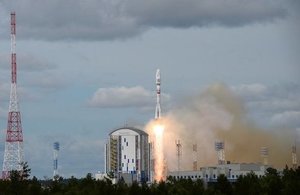Scottish supercomputer satellites launched into orbit
A pair of Glasgow-built satellites which could revolutionise how data is downloaded from space were successfully launched today

Lift-off of the Roscosmos Soyuz-2.1b launch vehicle from Vostochny, lofting the nanosats into orbit. Credit Roscosmos
Satellites are essential to modern life due to their application in navigation, finance, telecoms and in monitoring weather, climate change and air pollution. However, the data they collect can be slow to download due to the volume of traffic, with users often having to download very large files they don’t need just to obtain specific elements.
Spire Global operates a network of small satellites, known as nanosatellites, which collect and transmit a range of valuable data. The two new additions, supported by the UK Space Agency, will be able to process and cherry-pick data from other satellites in orbit before transmitting it to Earth, optimising and freeing up bandwidth for other tasks and users.
Graham Turnock, Chief Executive, UK Space Agency said:
Over the past five years, Glasgow has become the best place in Europe to build these innovative, small satellites, with Spire Global alone manufacturing more than 100 on the Clyde.
These new Glaswegian nanosats were launched from Russia, but we are working hard to ensure that in future we can design, build, test, launch and manage satellites as part of the UK government’s modern Industrial Strategy. We are also a leading member of the European Space Agency which delivers significant economic benefits back to businesses in the UK.
Both satellites, were developed under the European Space Agency’s (ESA) Advanced Research in Telecommunications Systems (ARTES) Pioneer programme, which transforms R&D investment into successful commercial products and services by offering varying degrees of support to projects with different levels of operational and commercial maturity.
Khalil Kably, Pioneer Programme Manager for the European Space Agency said:
The whole idea of the Pioneer Programme is to give European and Canadian industries access to space, rapidly and at low cost. As soon as they have an innovative idea, such as supercomputing by Spire here, we want people to be able to try it in orbit. It’s the ability to go from a new idea to market very quickly, through in-orbit validation.
Peter Platzer, CEO of Spire Global said:
We see these parallel supercomputing scalable devices as a crucially important next step for a new level of accuracy and timeliness in space data analytics. The UK Space Agency and ESA have been extremely forward-looking and supportive of Spire’s innovative approach to deploying space technology to solve problems here on Earth.
The UK Space Agency is also supporting a space incubation centre in Glasgow and has provided support to the Scottish Centre of Excellence in Satellite Applications, based at the University of Strathclyde and working across the whole of Scotland.
The Centre’s role is to raise awareness of the potential of satellite services and data to be used in new and improved products and services in other “space enabled” markets – including, for example, offshore renewable energy and aquaculture.
The UK Space Agency wants the UK to lead the new space age and is driving growth across the sector as part of the Government’s Industrial Strategy, with major initiatives including the £50m Spaceflight programme. The UK continues to be a leading member of ESA, which is independent of the EU.